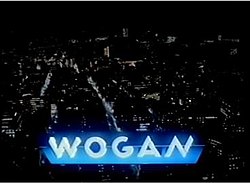History
Wogan's first foray into TV interviewing, and indeed to British television, was in 1972 on Lunchtime with Wogan on ITV. In 1973, he left ITV and joined the BBC. In 1980, he was given another chat show; What's On, Wogan? [1] running for 9 episodes in the spring of that year, primarily on Saturday evenings. In 1981, he had a chance to host a one-off chat show, Saturday Live. Among his guests on this show were Larry Hagman, promoting SOB , and Frank Hall. The show received a high profile with Hagman at the height of his fame starring as J. R. Ewing on Dallas . A year later, Wogan was given his own chat show, Wogan, initially broadcast on a Tuesday evening, the series was moved the following year to Saturday nights to replace Parkinson .
When BBC1 was relaunched on 18 February 1985, the show was moved to weekday evenings at 7:00pm, running three nights per week on Mondays, Wednesdays and Fridays. [2] Michael Grade, controller of BBC 1 at the time, said: "When I took over BBC1, I discovered there were wonderful things, it was just a case of where to put them." [3] Grade also said "The series would bring a much needed element of surprise and unpredictability to BBC Television". [4]
Cancellation
By December 1991, Wogan had lost 4 million viewers, and the show was axed. [5] [6] During this time, BBC Scotland often moved the Friday edition to a late night slot. The final edition was broadcast on 3 July 1992, [7] and replaced with the ill-fated soap Eldorado .
Wogan briefly hosted a new weekly late night chat show, Terry Wogan's Friday Night, which started on 2 October 1992. [8] However the new series was not a success and was cancelled after 20 episodes, ultimately leading to Wogan returning to radio in his Radio 2 breakfast slot. The series ended on 5 March 1993. [9]
In 1996, Wogan criticised the BBC over its handling of the show since the BBC had refused his wish to give up the series in 1991, instead carrying on for a further year. Wogan said "I felt peeved by the insensitivity – no, incompetence of how it was handled". [10]
In March 2015, BBC Two launched a new compilation series, Wogan: the Best Of featuring selected interview segments and music performances from Wogan's past chat series, linked by new introductions. [11]
Wogan Now and Then
Wogan presented Wogan Now and Then in 2006, for UKTV Gold and produced by Spun Gold Television. Wogan spoke again with former guests from original series along with new guests. Thirteen hour-long episodes were made. [12]
Guest hosts
Over the course of the show's run, when Wogan himself was unavailable to host the show, guest presenters were brought in, with Selina Scott being the first stand-in in 1985. Others included David Frost (in 1986), Ronnie Corbett (in 1986), Kenneth Williams (in 1986), [21] Ben Elton (in 1989), Joanna Lumley (in 1989), Selina Scott (again in 1991), Jonathan Ross (in 1990), Gloria Hunniford (in 1991), Felicity Kendal, Esther Rantzen and Bruce Forsyth. The most successful stand in was Sue Lawley (in 1988) who became the most frequent replacement for the host and indeed for some time was Wogan's 'official' stand in. When Lawley gained her own late night chat show Saturday Matters with Sue Lawley on BBC1 in 1989, other celebrities again took it in turns to stand in for Wogan.
This page is based on this
Wikipedia article Text is available under the
CC BY-SA 4.0 license; additional terms may apply.
Images, videos and audio are available under their respective licenses.
